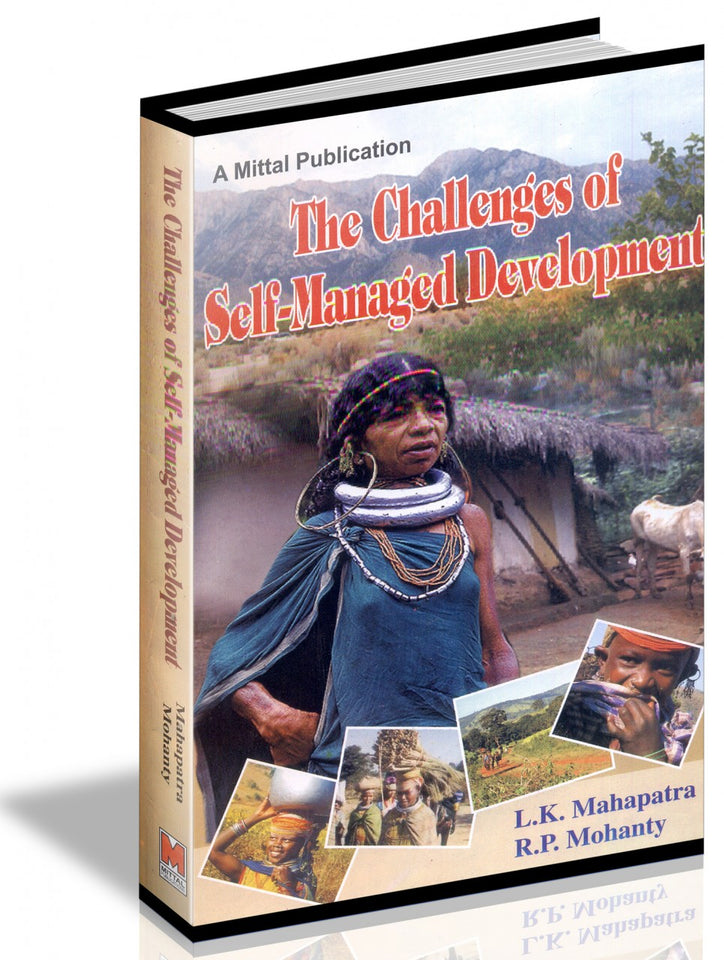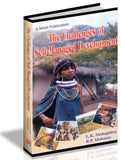The Challenges of Self-Managed Development
Regular price
Rs. 595.00
Development of primitive tribes has been one of the major goals of the government right from the beginning of the first plan period. But this has failed time and again because of certain technical and administrative lacunae and also because of the fact that the primitive tribes are intrinsically attached to their homeland in various ways and are not in a position to risk that for uncertain development. In 1950 the famous anthropologist, Verrier Elwin, had brought out an epoch-making book: The Bondo Highlander. The Bondo or the Bonda, as they are known in Orissa, are feared due to their proneness to violence at the slightest provocation, whether among themselves or in relation to outsiders. Hence development efforts have been halting and fraught with violence in their Hills. Taking the previous natural or cultural hindrances for their development into consideration, an attempt has been made in this study to show as to how the so-called "fierce" and home-loving primitive Hill Bonda could be rehabilitated within their hill abode without being brought to the plains. The study is broadly divided into 4 sections with a total of 11 chapters. In the first section, a vivid picture on the social and economic lifestyle of the Bonda has been presented as the background information. In the next section, the availability of natural and other resources has been sorted out scientifically with the help of experts from several relevant disciplines. The subsequent two sections deal with resources management and feasibility of adoption of cash crops and other avenues depending upon the local possibilities and how these could economically be exploited to the optimal level for self-sufficiency. In the last, the aspirations of the people have been analyzed considering the extent of their expressed readiness to accept the avenues scientifically perceived. Moreover, how they would manage to acquire critical resources and sustained cooperation in future without the help of the outsiders has also been conceptualized. Thus, this work has a scientifically perceived holistic thrust of in situ development of Hill tribes, particularly the Bonda Highlanders, as a social-technological experiment. This book, no doubt, will be of great use for the action planners, administrators, researchers, academicians and all those who are interested in in situ development of the Hill tribes and other communities inhabiting hill regions.
L.K. Mahapatra, (b.1929) Dr. Phil. (Hamburg) has been the Chairman, (2003-2006) Nabakrushna Chaudhur Centre for Development Studies, Bhubaneswar. A former Vice-Chancellor of Utkal and Sambalpur Universities, Professor Mahapatra has had a long academic career since 1953 in research and teaching at Universities in India and he has been a Visiting Professor at Hamburg University. He has also been a National Fellow of ICSSR, New Delhi, and the Ford Foundation Fellow for research, and UGC National Lecturer in 1970-71 and 1983-84. A recipient of national and professional awards, he is an Emeritus Professor in India in Social Anthropology and a Social/Cultural Historian and Folklorist. He has published papers in India and abroad (in books by the UNESCO and The World Bank, Greenwood Press and Macmillan Press, Mouton Press, the Hague/Paris and ICSSR etc.) on tribes, tribal development, health and nutrition, temples, rituals, caste system, princely states, village, forest ecology, social movements, human rights and development-impacted deprivation etc. He has contributed to the Encyclopedia of World Cultures and to the World Survey of Muslim Peoples as also to the Southeast Asian countries. He had been a Consultant to the UNESCO (1979) and The World Bank (1985-96) and Director of many research projects in India. His latest books are: Tribal Development in India: Myth and Reality (1994), Resettlement, Impoverishment and Reconstruction in India: Development for the Deprived (1999), State, Society and Religion-Culture Historical Comparative Perspectives of South Asia (2003), Cultural Traditions of Orissa: Civilization, Society and World View (2005). R.P. Mohanty (b.1963) has obtained his M.A., M.Phil, and Ph.D. degrees in Anthropology from Utkal University, Orissa. With first class career and about 20 years of experience in the subject, so far he has authored more than 50 research papers, published in Various journals, encyclopedias, ethnographic atlases, edited volumes and magazines of repute. Apart from these, he has 7 books including this one. His earlier books are on the Development of Dalits (2003), problems of the Aged in India (2005), Urbanization and Street Children (2005), Family Welfare in India (2005), Status and Empowerment of the Girl Child (2005) and Culture, Gender and Gender Discrimination in Caste Hindu and Tribal Contexts (2007) and forthcoming book is on the primary Education in Tribal India. He has been closely associated with as many as 22 important research projects funded by various development agencies including government bodies and The World Bank etc. and so far authored a dozen of research reports. He has extensively worked among the aggressive Hill Bonda tribe and for this, he has been conferred with the 'Bharat Mata Award in 2001. presently he is based at N.K.C. Centre for Development Studies, Orissa, and engaged in the problems of the spastic children. His areas of interest include: development of tribes especially the hill tribes, development of Dalits, ethnographic and cultural studies and the present social problems.
Guaranteed Safe Checkout





